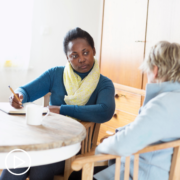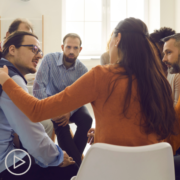What Are Your Go-to Coping Mechanisms While Living With Cancer? from Patient Empowerment Network on Vimeo.
Lisa and Thomas, living with Myeloma along with Donna and Diana, living with NHL share their unconventional ways they’ve found to cope with cancer. They share times when humor has helped them through dark moments and how exercise keeps them in high spirits.
See More from PEN-Powered Activity Guide 12
Transcript:
Lisa Hatfield:
Hi, my name is Lisa Hatfield, I’m the myeloma Empowerment Lead for Patient Empowerment Network. We are going to have a program today., I’m super excited about with some panelists who are going to a little bit lighter program, going to talk about humor in cancer and maybe laughter, happiness and cancer. Quick disclaimer that this program is solely based off of our patient experiences, and it is not intended to be a substitute for your professional medical advice. Please talk with your medical team if you have any questions about your medical condition. So we’re going to start right off with our panelists introducing themselves, and we have actually two different types of cancer that are being represented today, we have protected blood cancer, multiple myeloma, and diffuse… I remember how to say it, diffused large B-cell lymphoma. I think it’s a type of non-Hodgkins lymphoma, is that correct? Okay, yes. So, I’m one of the Multiple Myeloma patients I’ve been… I’ve had multiple myeloma for four years now, doing relatively well, my bio markers in my blood are stable, I’m not really in remission because my bone marrow biopsy has come back positive, but doing well in general. Mentally, I’m doing great.
Feel pretty good about things. And that’s why we’re here today. So, we’re going to just go around the room, the Zoom room, and I’ll just start from my left to right around. So, with Diane, you can just give your name, type of cancer, any treatment you’ve had, where you’re at now, and anything else you want to share about yourself?
Diana:
Sure, Diana Bosse, and I am one of those diffused large B cell lymphoma survivors. I was diagnosed in April of 2019, so I’m about getting close to four years out, which is promising. Doing great today. And just really happy to be here. I’m the author of a book called The Perks of Having Cancer, which I wrote during my treatment, so it was what kind of motivated me and kept me going.
Lisa Hatfield:
Thanks, Diana and going around my room here… Thomas, your next in line.
Thomas:
Hi, I’m Tomas Goode, and I am a multiple myeloma survivor. This year, 2023 makes 18 years for me. I was diagnosed at a very young age of 34 years old, and I am now living with this disease, and I want to show everybody how to… How I utilize my time to live with this disease.
Lisa Hatfield:
Alright, thanks, Thomas. Donna.
Donna:
Hi, I’m Donna Landsman, I’m also a diffused large b-cell survivor. I was diagnosed in 2013. I was re-diagnosed two years ago with follicular lymphoma, which is indolent and slow-growing, and honestly, if I never have symptoms, I never have to be treated, so fingers crossed.
Lisa Hatfield:
Alright, we’re crossing them. Thanks, Donna. So, I was going to just mention, you guys can jump in a time… How all four of us met, we came together just a few months ago, I feel like we know each other super well now because we’ve stayed in contact, but in case anybody is wondering, we were brought together by the patient advocacy segment of a biotech company on the east coast near Boston. We did not know each other prior to that, and we worked on helping this particular organization understand the patient perspective, we also did a couple of activities where we all tried to support other patients who are… Who are may be located in hope lodges or receiving treatment and staying in hope lodges around the country. So over the course of two or three days, the four of us who were complete strangers coming together, had the best time together, at least that’s my perspective, I might be projecting that on to you thinking I had the best time, but we had a great time together, and I’ve always tried to maintain a decent attitude, a pretty positive attitude about my cancer and my diagnosis after having met the three of you and working together, it really reinforced how important positivity and having a sense of humor, even if it’s about our cancer, which we’ll talk about a little bit later.
So, we’re going to be talking about humor and cancer, and that incorporates anything about positivity and cancer humor or laughter, happiness, they’re all different, but I think pretty important in dealing or coping with our cancer diagnosis. So just wondering if any of you have anything to share about how prior to diagnosis or just in life in general. So, anybody watching this has some thoughts or tips on what do you do to create more humor in your life or to acknowledge more humor, to be more humorous or have more positive in your life? Donna, any suggestions, any thoughts on how you…
Donna:
Well, you know, you kind of brushed upon a subject a little bit it before, and so I really do need humor in my life, I need comedy, and so for me, I try to watch whatever I can… Like you had mentioned, America’s Funniest videos, I watch comedians. You know our own personal experiences, like with Sebastian Maniscalo, I listen to a lot because I relate to that type of humor, and so that actually took some of the edge off of a lot of my uneasiness or when things were like a really dark, deep day for me, I really look for humor and I need it, and you know like you said, we can find humor of going through our cancer experiences, and some of it is relatable and some of it isn’t. For some of it we can say Ah ha, yeah, I’ve been there. And so, it’s a way to touch upon something that another person can relate to, so I thought that was… I really liked the subject because I think we need more humor, and I think it needs to be lighter, so… It’s great. Yeah, really.
Lisa Hatfield:
And Thomas, I know both you and Donna mentioned, it doesn’t really have to be humor, but even how you cope with some of the things that you talked about, working out, exercise, so you can talk about humor or exercise or both, how you used those for coping mechanisms.
Thomas:
You know with humor, I utilize my groups, this group that I’m in, my group of guys that I ride my bikes with, the group of guys that I exercise with, we all keep each other laughing so much just by sending us stupid stuff we find on the internet, TikTok, whatever, and that really enlightens our day. But another coping mechanism is me in the gym. All throughout my myeloma journey I’ve utilized that as a way of outlet… A way of de-stressing you realizing that as an opportunity to take out everything that I have on the exercise equipment versus me sitting in and thinking about it, so I like to cope with anything that I’m dealing with in the gym like that.
Lisa Hatfield:
That’s awesome. And Thomas inspires all of us by sending pictures out so we can see him in the gym, makes us get up off the couch or you guys probably are good about the other two ladies, I’ll be like, Oh, I better get moving cause Thomas just sent a picture, I’m better going to do something. So yeah, Donna go ahead.
Donna:
I wanted to say that actually, I tell my children, I tell everybody that exercise is my drug of choice, and I exercise all through my chemo treatments, whether I did five minutes, whether I did seven minutes, my gym was open in my building 24 hours and I just needed to get down there to do something, and it was really a way to release… We really weren’t able to drink alcohol and not that I drink a lot anyway, but I needed to do something and the physical outlet was the best for me, really. And so, I’m with Thomas. Thomas and I worked out the day of our last day in the Boston area.
Diana:
We saw the pictures.
Thomas:
Yes, we took a one-handed selfie.
Diana:
I agree, I think exercise is a great release, and for me, if you… I went to yoga classes when I was going through my treatment, and if you saw me trying to do some of the yoga poses, that in itself was very humorous. I get tangled up.
Lisa Hatfield:
I’m like you guys, I like to work out. I don’t work out as much as you do, but I go for walks and whatnot, and that definitely helps me cope, and also just being around my friends. Thomas mentioned being in groups, but being around other people… I have a friend who is Greek, and she embodies that Greek passion and exuberance, and she is the side of me that… Things that are going through my head, she says them out loud, I love being around her, and I’m just going to mention this really quick, cause it has to do with my friend who’s that with my friend who is Greek, but Diana is an author, like she mentioned, she wrote, I have this book as my prop here, The Perks of Having Cancer, and no, Diana has not paid me or bribed me, or even given me chocolate for talking about her book, I just talk about books, that I like to read, but there’s one excerpt in there about watching reality TV, and it references Dr. Pimple Popper. Well, what I did actually right after I was diagnosed for fun, I think was I never watched reality TV, especially the really gross things, but I found it the grossness of that kind of funny.
So, I talked, I asked my best friend one night. Let’s have a gross TV night and watch something, not Dr. Pimple Popper, but just totally disgusting called The Toe Bro. And I might add, if I’m allowed to say that we do happen to have a retired podiatrist, so talking right now, Donna. So, where she might make money off of looking at feet… I’m disgusted by feet, so we watched The Toe Bro and my friend who has no problem making she’s full of one liners, she’s ridiculously funny watching The Toe Bro. She was making comments, I was laughing my head off, watching reality TV, which is so out of character for me anyway, that’s how I found humor and laughter, I guess before and during my treatment with my myeloma… Go ahead Donna.
Donna:
In my defense as a retired podiatrist, I just want to say that it’s better than some of other aspects of our anatomy, so toes were fine for me













